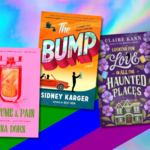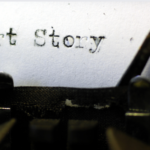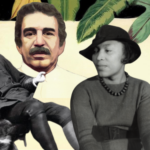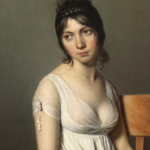
Who Said That?: Why Some Books Forgo Quotation Marks
If you’re familiar with Sally Rooney’s books (or likely if you’ve just heard of her), you probably also know she doesn’t use quotation marks in her work. It’s a seemingly polarizing choice with both five-star and one-star reviews citing the lack of dialogue punctuation as their reason. Other reviewers declare it took some getting used to, it made it impossible to read, it sucked them right in. But why choose to get rid of the established punctuation protocol we expect when picking up a novel?
A Brief History of Quotation Marks
The quotation mark developed from what was known as a diple, carrot-looking mark used in Greek texts. Back then, the function was more of an attention grabber, placed in the margins of a piece at moments of emphasis whether it be dialogue or description or even additional commentary. It was named “diple”, meaning double, after the number of pen strokes it took to create. Writers’ use of the mark varied person to person, sometimes dotted or curved, sometimes vertical, sometimes reversed. They functioned as indicators of how to say something, when to pause, or even where to take a breath. Funnily enough, Ruth Finnegan in Why Do We Quote? The Culture and History of Punctuation wrote these variations were seen as “corrupt” and indicated scribes had forgotten “how their elders and betters had indicated citations” which just goes to show these adaptations of punctuation, and the societal pushback (or niche acceptance) are par for the course.
Later, the diple was replaced by a double comma with the invention of the printing press and, with it, a need to standardize the format of citations. According to Finnegan, they were dubbed “inverted commas” for their shape and their function, and while it took a while, they moved from being an indicator from the margins to being part of the line of the text itself through the 17th century. At this time, the meaning of the word quote took on the way we see them, as a grammatical tool for the reading eye. They indicated passages were from another source or, later, they marked dialogue, which is the way they more or less function today.
Why Write Without Quotation Marks?
So, why get rid of these little marks that have become so ingrained in the way we read literature? Well, it’s not necessarily a new concept. Writers like Virginia Wolf, Gertrude Stein, and Cormac McCarthy chose at some point or another to do away with quotation marks in their works. McCarthy discussed his lack of punctuation in an interview with Oprah, saying there’s no reason to block a page up with marks if your writing is clear. And that makes a certain kind of sense. The writing, then, becomes more immediate, more stream-of-consciousness.
If you’re, for example, reading Boys of Alabama by Genevive Hudson, a novel about a boy who moves from Germany to Alabama and has to navigate the brutal adaptation to a new language, a new culture, a new life, it makes sense that the writing style would reflect that difficulty, that needing to go back and determine if something really was dialogue after all, much like the character needs people to repeat themselves, to clarify, throughout his transition.
At other times, this forgoing of the marks can make a reader feel “part of the flow of conversation” rather than outside of it looking in, as one reader said of Rooney’s Beautiful World, Where Are You? in The School Librarian‘s Spring 2022 issue. This is seemingly in the vein of McCarthy’s protests against them, in that the less punctuation on the page the less visual interruption to the eye and, by extension, to the narrative.
In other novels, like Where Reasons End by Yiyun Li or The Friend by Sigrid Nunez, the characters deal with grief and loss, suggesting a certain kind of distancing and alienation by not speaking to the reader in the way we expect to be spoken to.
There are many ways removing quotation marks can add to a story. But there are consequences to this choice to bypass traditional punctuation too.
Why Keep Quotation Marks Right Where They Are?
This can sometimes, intentionally, add a layer of difficulty to the reading experience. Dorothy Richardson, despite forgoing quotation marks in her works, told Bryher in The Heart to Artemis: A Writer’s Memoirs that it was a mistake and that it created “unnecessary difficulties” for her readers.
Laura Miller in her article “All I want for Christmas is quotation marks” published in Salon back in 2009 made a rebuttal against the practice. Apparently E.L. Doctorow once said quotation marks aren’t necessary since “you can tell when it’s dialogue,” but Miller argues that doesn’t mean you should get rid of it.
It’s a valid point. Just because you can understand the text without them doesn’t mean the little marks don’t have a function. You have to work harder to get the meaning, to understand the text, or even to understand on the surface level what’s actually going on if thoughts and dialogue intermingle. It’s an added difficulty to an activity often sought out to get people away from the difficulty of life: of work and school and family mayhem. Some readers, understandably so, don’t want to then have to take the added time to double back, over and over again, to find out if a line was dialogue or not, when a perfectly functional punctuation mark could have told them that with ease.
In the end, I think its wholly dependent on whether you like an experimental aspect to a novel. Which is not a surprising conclusion. For me, I know that depends on my mood, the concept and themes, or even how much I like an author and am willing to adapt. For others, this could be a complete no-go. Writing, at the end of the day, is subjective, and choosing to pick up or not pick up a quotation free novel is the same as a genre preference or a tendency to like novels with funky formatting.
If you are someone who enjoys a little bit of messing around with punctuation, there’s a whole list of books without quotation marks on Goodreads for you to peruse. Also, for a bit of formatting fun, try these seven books with unusual and unconventional formats!










